
| Lane Home Page | Search Lane |
| Contact RT | Website Accessibility |

| Event Scrapbook | ||
| Evaluations | ||
| About Reading Together | ||
| Reading Together in Past Years | ||
| Contact Us | ||
| Reading Togther Main Page | ||
Reading Together 2005-06
Books | News | Calendar | Scrapbook | Faculty | Reading List
Featured Books
- Refuge: an Unnatural
History of Family and Place
by Terry Tempest Williams
- Blessing the Boats: New and Selected Poems 1988-2000
by Lucille Clifton
- See General Resources for links with more information about the authors and books, including interviews, critical reviews, bibliographies, audio readings, and more.
Refuge: an Unnatural History of Family and Place
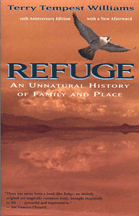
Terry Tempest Williams, noted author and former naturalist-in-residence at the Utah Museum of Natural History, explains, in an interview with Scott London, “I can tell you that in Refuge the question that was burning in me was, How do we find refuge in change? Everything that was familiar had been turned inside out with my mother’s diagnosis of ovarian cancer and with the Bear Migratory Refuge being flooded.” As readers, through the lyrical power of Williams’ writing, we also experience the chaos of that flux, and the attempt to forge new understandings from that profoundly altered world. Williams’ relationship to her family and place are deeply intimate, so intimate that her body appears permeable. She is no longer in control, and she knows it, yet also has the wisdom to know that she will only survive by letting go. Only by letting go will she be able to hear her teachers—her dying mother and the wildlife refuge, now so flooded that it can no longer serve as refuge for the birds and other animals that historically nest there. And Williams knows that if she does not hear the lessons, then she will have dishonored those and that which she loves, as well as herself. She knows that she must listen in order to learn how we sustain ourselves and the places we inhabit.
In that same interview with London she states, “The notion that we can extend our sense of community, our idea of community, to include all life forms -- plants, animals, rocks, rivers and human beings -- then I believe a politics of place emerges where we are deeply accountable to our communities, to our neighborhoods, to our home. Otherwise, who is there to chart the changes? If we are not home, if we are not rooted deeply in place, making that commitment to dig in and stay put ... if we don't know the names of things, if don't know pronghorn antelope, if we don't know blacktail jackrabbit, if we don't know sage, pinyon, juniper, then I think we are living a life without specificity, and then our lives become abstractions. Then we enter a place of true desolation.”
Author Barry Lopez states, "Remarkable....Her demonstration of how deeply human emotional life can become intertwined with a particular landscape could not be more relevant to our lives." Laurie Tynan in the Library Journal speaks to the inclusive range of William’s vision; “Williams's book is difficult to pigeonhole because she wrestles with a wide range of ethical questions in her struggle to find understanding." And the San Francisco Chronicle captures the essence of this amazing work: "There has never been a book like Refuge . . . utterly original."
Terry Tempest Williams Official Biography
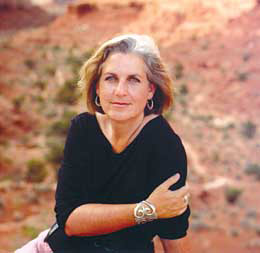 |
 |
from www.coyoteclan.com
Terry Tempest Williams grew up within sight of the Great
Salt Lake in Salt Lake City, Utah. She says simply, "I write through
my biases of gender, geography, and culture. I am a woman whose ideas
have been shaped by the Great Basin and Colorado Plateau, these ideas
are then filtered through the prism of my culture and my culture is Mormon.
The tenets of family and community which I see at the heart of that culture
are then articulated through story."
Williams is perhaps best known for her book Refuge: An Unnatural History
of Family and Place (Pantheon, 1991), where she chronicles the epic rise
of Great Salt
Lake and the flooding of the Bear River Migratory Bird Refuge in 1983, alongside
her mother's diagnosis with ovarian cancer, believed to be caused by radioactive
fallout from the nuclear tests in the Nevada desert in the 1950's and 60's, is
now regarded as a classic in American Nature Writing, a testament to loss and
the earth's healing grace. The San Francisco Chronicle wrote, "There has
never been a book like Refuge. . . . utterly original."
Her most recent book, Red: Patience and Passion in the Desert (Pantheon, 2001),
traces her lifelong love of and commitment to the desert, inspiring a soulful
return to "wild mercy" and the spiritual and political commitment of
preserving the fragile redrock wilderness of southern Utah.
Departing from the natural landscape, another recent work, Leap (Pantheon, 2000) is an unexpected pilgrimage into the habitat of Hieronymus Bosch's medieval triptych masterpiece The Garden of Delights. With spiritual candor, psychological immediacy and emotional intensity, Williams uncovers deep connections between contemporary life and the world of this startling, five hundred-year-old painting depicting Paradise, Hell, and The Garden.
Her other books include a collection of essays, An Unspoken Hunger (Pantheon,
1994); Desert Quartet: An Erotic Landscape (Pantheon, 1995); Coyote's Canyon
(Gibbs M. Smith, 1989); and Pieces of White Shell: A Journey to Navajoland (Charles
Scribner's Sons, 1984). She is also the author of two children's books: The Secret
Language of Snow (Sierra Club/Pantheon, 1984); and Between Cattails (Little Brown,
1985).
Her work has been widely anthologized, having also appeared in The New Yorker,
The Nation, Outside, Audubon, Orion, The Iowa Review, and The New England Review,
among other national and international publications.
In 1991, Newsweek identified Williams as someone likely to make "a considerable impact on the political, economic, and environmental issues facing the western states this decade." She has served on the Governing Council of the Wilderness Society and was a member of the western team for the President's Council for Sustainable Development. She is currently on the advisory board of the National Parks and Conservation Association, The Nature Conservancy, and the Southern Utah Wilderness Alliance. She has testified before the United States Congress twice regarding women's health and the environmental links associated with cancer, and has been a strong advocate for America's Redrock Wilderness Act.
As an editor of Testimony: Writers Speak On Behalf of Utah Wilderness, she organized twenty American writers to pen their thoughts on why the protection of these wildlands matter. When President William Jefferson Clinton dedicated the new "Grand Staircase-Escalate National Monument" on September 18, 1996, he held up this book on the North Rim of the Grand Canyon and said, "This made a difference."
She was recently inducted to the Rachel Carson Honor Roll and has received the National Wildlife Federation's Conservation Award for Special Achievement.
The Utne Reader named Terry Tempest Williams as one of their "Utne 100 Visionaries," in their words, "a person who could change your life." She has been a fellow for the John Simon Guggenheim Memorial Foundation and received a Lannan Literary Fellowship in Creative Nonfiction.
Formerly, naturalist-in-residence at the Utah Museum of Natural History, Ms. Williams now lives in Castle Valley, Utah, with her husband Brooke Williams.
© Copyright Terry Tempest Williams, 2002.
Blessing the Boats: New and Selected Poems 1988-2000
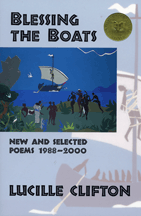
Lucille Clifton has said, “I’ve always been a person who found more interesting the stories between the stories. I’ve always wondered the hows and the whys to things. Why is this like this? What has gone into making us who we are? Is it good or not so good? What is destroying us? What will keep us warm?” In her collection of poems, Blessing the Boats, winner of the National Book award, Clifton explores these stories of our making in a strong, yet unassuming voice, a voice which is unadorned, simple but never simplistic. Perhaps to emphasize this simplicity, Clifton dispenses with conventional capitalization. She uses the language of our daily lives, yet this language becomes somehow elevated through her deep sense of humanity and justice. Elizabeth Lund, in the Christian Science Monitor, states that Clifton’s “stunning imagery sears the senses, and her rhythms demand to be heard." Library Journal states, “Clifton's poems owe a great deal to oral tradition. . . her keen sense of rhythm, of the sound, tone, and texture of words, is delightful, a rare find in this day and age. . Clifton's voice, her unique vision and wisdom, make this book essential”.
Clifton’s poems are simultaneously intimate and personal, universal and political. Her stories are rooted in the body. She writes of her struggle with cancer, of the challenge of race in America; she writes from her perspective of her gender as a woman, and as a mortal being trying to make spiritual sense of it all. Yet, she does not forget the irony and humor of our human condition. In her series of poems addressed to Clark Kent (aka Superman), Clifton asserts, “they had it wrong,/ the old comics./ you are only clark kent/after all. oh,/ mild mannered mister,/ why did I think you could fix it?”
Above all, in Clifton we hear the honesty of a voice compelled by the need to get these stories out and shared. In her title poem, “blessing the boats,” Clifton hopes, “may the tide/ that is entering even now/ the lip of our understanding/ carry you out/ beyond the face of fear”. Her poetry takes us to a place of beauty and hope that is capable of doing just that.
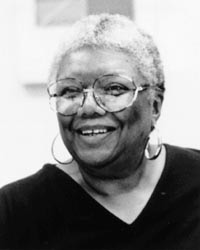 |
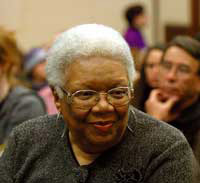 |
Lucille Clifton was born in Depew, New York, in 1936. Her
books of poetry include Blessing the Boats: New and Selected Poems 1988-2000
(BOA Editions, 2000), which won the National Book Award; The Terrible
Stories (1995), which was nominated for the National Book Award; The
Book of Light (1993); Quilting: Poems 1987-1990 (1991); Next: New Poems
(1987); Good Woman: Poems and a Memoir 1969-1980 (1987), which was nominated
for the Pulitzer Prize; Two-Headed Woman (1980), also a Pulitzer Prize
nominee and winner of the University of Massachusetts Press Juniper Prize;
An Ordinary Woman (1974); Good News About the Earth (1972); and Good
Times (1969). She has also written Generations: A Memoir (1976) and more
than sixteen books for children. Her honors include an Emmy Award from
the American Academy of Television Arts and Sciences, a Lannan Literary
Award, two fellowships from the National Endowment for the Arts, the
Shelley Memorial Award, and the YM-YWHA Poetry Center Discovery Award.
In 1999 she was elected a Chancellor of The Academy of American Poets.
She has served as Poet Laureate for the State of Maryland and is currently
Distinguished Professor of Humanities at St. Mary's College of Maryland.
--from the Academy of American Poets
http://www.poets.org
Lane Community College - Reading Together |
